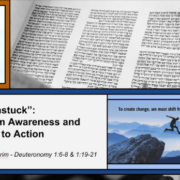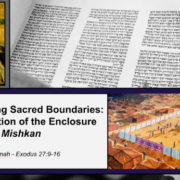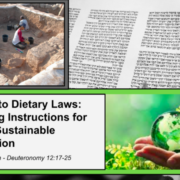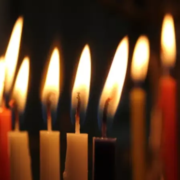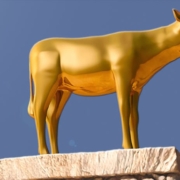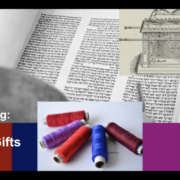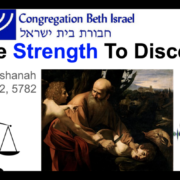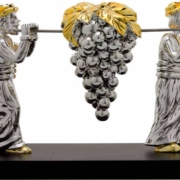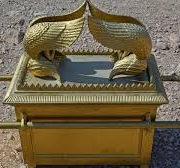This guest post is the D’var Torah that CBI member and cantorial soloist Ziva Larson offered at Shabbat Morning Services on Saturday, July 22, 2023.
This guest post is the D’var Torah that CBI member and cantorial soloist Ziva Larson offered at Shabbat Morning Services on Saturday, February 25, 2023.
This guest post is the D’var Torah that CBI member Ziva Larson offered at Shabbat Morning Services on Saturday, August 27, 2022.
This guest post is the D’var Torah that CBI member Ziva Larson offered at Kabbalat Shabbat services on Friday, June 17, 2022.
“…The thing is, there’s holiness in the not-knowing. There’s holiness in opening ourselves to the uncertainties of wilderness. It’s no coincidence that our ancestors hear God’s voice most clearly in the wilderness. The midbar (wilderness) is where God m’daber (speaks) — or at least, where we hear….”
This week’s Torah portion contains one of my favorite verses: “Let them make Me a sanctuary, that I might dwell among them.” The Hebrew could also mean “within them.” We build God a sanctuary so that God — holiness, love, justice — can dwell within us….
On Sunday evening I offered a tiny pearl of introduction to this year’s high holiday theme of gevurah. Yesterday morning we talked about the strength it takes to help each other find hope.
Today our exploration of gevurah comes via the Torah reading for this morning.
Our mystics taught that God’s infinity is revealed in creation through a series of sefirot, divine qualities or emanations. These are the channels through which God’s infinite energy flows into the world, and we associate each one with a quality that we and God share. Like chesed, lovingkindness — last year’s high holiday theme. And gevurah, boundaries and strength and power and discernment — this year’s theme.
When our mystics look at the figures in Torah, they associate different characters in Torah with each of the sefirot. Abraham is associated with chesed, lovingkindness. His tent was open on all sides, he rushed to prepare a feast for visitors, he represents flowing love. And his son Isaac is associated with gevurah.
One of the reasons why Isaac is associated with this spiritual quality is surely the story we just heard, the “binding of Isaac.” How do we see Isaac’s strength in this story? Arguably, what we see is him holding still and letting himself be bound. Maybe he feels powerless, or overwhelmed, or out of control: we don’t know, because Torah doesn’t tell us! But to me, his gevurah has a kind of stoic, silent perseverance to it. He holds still and trusts that he will make it through somehow.
Abraham showed tremendous gevurah earlier in Torah. In midrash, we learn that his father was a builder of idols, and young Avram smashed them. It’s a great story: Terach comes home, all of the idols in his shop are smashed save one, and the biggest one has a stick in its hand. And he yells, what did you do?! and Avram says, “oh, it wasn’t me, dad, the big one did it.” And his father says, “You know they’re just stone. They can’t move!” and Avram retorts, “so why do you worship them, then?” It took gevurah to stand up to his dad.
Or earlier in Genesis, when God disclosed intentions to destroy Sodom and Gomorrah. Remember, Avraham pushed back: what if there are fifty righteous there, what if there are forty, all the way down to ten. But when it comes to Sarah casting-out Ishmael in yesterday’s Torah reading, Avraham doesn’t do much. He tells God he doesn’t like it, but he doesn’t challenge it. And in today’s story, God makes an outrageous request and Avraham just… does it. As Rabbi Danya Ruttenberg notes, he’s a hero when it comes to the outside world, but with his own sons, he falls far short of offering the protection they need.
One of my favorite ways of reading Torah is to place ourselves in the shoes of everyone in the story. Through the lens of Torah we can see ourselves refracted in new ways. And in empathizing with everyone in Torah’s story, we strengthen our capacity to stand in the shoes of another.
How does it feel to empathize with each figure in today’s story, to feel-into where they are?
Maybe Isaac’s kind of gevurah resonates for us, eighteen months into this pandemic. The pandemic has highlighted so many ways we aren’t in control. We don’t have the power to make COVID-19 go away, and we don’t have the power to require other people to do what’s right. But we can use our strength to accept our circumstances and make the best of the hand we’re dealt.
Isaac must have also felt fear. His father had the knife raised for the strike before the angel intervened. We too feel fear in these pandemic times. What might it mean to follow in Isaac’s footsteps and do what life’s situation asks of us, even when we feel afraid?
I don’t especially want to empathize with today’s portrait of Avraham. But like Avraham who followed instructions in today’s story, we too hear voices — day and night, over the internet and cable news and social media — telling us what to do and why. We may be more like Avraham than we want to realize.
Today’s Torah reading begins with the words, “After these things, God tested Avraham.” in English we call this the “Binding of Isaac,” but Torah calls this a test. I’ve always felt that Avraham failed the test: he should have pushed back. He didn’t exercise the discernment to recognize that God’s instruction here was wrong. Discernment is part of gevurah, too.
Gevurah asks us to discern when the voices we’re listening to are giving us good advice and when they’re not. Sometimes the voices we hear are self-serving or toxic. Some voices today declare that the masks we wear to protect against airborne infection are “muzzles” that take away our freedom. Other voices proclaim that as human beings in a society we have a responsibility to take care of each other. What voices will we heed in 5782?
Recently, as I was studying this story again, my son asked me what I was learning. His Hebrew name is after my maternal grandfather, Isaac — in Hebrew, Yitzchak, the name of the son whom Avraham almost sacrificed. I realized he didn’t really know this story yet. So I told it to him, in outline, curious to know how it would land with him.
(And yes, he gave me permission to tell this story to you today.)
His first reaction was: God — He, or She, or They — probably isn’t giving us the full story here. “God is giving us pieces and parts to figure out for ourselves, but God might overestimate or underestimate us.” And then he said, “Loyalty to God is a good thing, but Abraham could have found a loophole. We have choices. We need to feel in our jellies when we’re treating people wrong or making a wrong choice.”
I said, “You mean, we need to learn to use our discernment?” Yes, he said. That’s a good word for it.
We need to use our discernment to know when the voices we’re following are aligned with our highest values — and when they’re not. Discernment is another way of saying, gevurah.
It’s also noteworthy who’s not in this story. Sarah appears nowhere in this part of the narrative. The next thing we read, after this story, is that Sarah died at 127. From that juxtaposition one midrash imagines her hearing the news from afar, perhaps in a garbled form indicating that her husband actually sacrificed their son, and dying on the spot.
After the way we saw Sarah behave yesterday — banishing Hagar and Ishmael into the desert — I don’t especially want to empathize with Sarah, either! But when I place myself in her shoes, I can feel her grief and horror at the news of her child’s death. (Of course, that news turns out to be wrong. Fake news, as it were. But she still grieves — and dies.)
It takes gevurah to place ourselves in someone else’s situation. It takes gevurah to rein in our own reactivity so we can empathize with someone’s heartbreak even if their past behaviors made us angry. Empathy might seem like an expression of chesed, lovingkindness — but I think it requires our gevurah.
Maybe this feels a little bit uncomfortable. Maybe we don’t want to empathize with people who we perceive made bad choices. That’s a very human response. To our ancestors, it was also an angelic one!
We see this in a midrash on part of the Exodus story. When we crossed the sea, Talmud says, the angels rejoiced when the waves crashed in and washed away the Egyptians. This is Pharaoh and his army we’re talking about. They had caused unimaginable suffering. And God says, “the works of My hands are dying, and you want to sing praises?!” Like — what’s the matter with you; develop some empathy, would you?! For this reason we pour out drops of juice or wine, symbol of joy, from our second cup at seder. We diminish our joy because someone else suffered in our journey to liberation.
Not wanting to empathize with someone we don’t like or don’t agree with is a very human reaction… and that midrash comes to teach us that Jewish values ask us to rise above that reaction.
Gevurah is how we balance between feeling our righteous anger, and reining in our anger so that we don’t lose empathy. Gevurah is in how we exercise judgment, especially when it comes to which voices we will heed and amplify. Gevurah is in the strength to be still and trust sometimes, and the strength to take bold action sometimes, and the discernment to know which times are which.
And gevurah is what allows us to be alert for possibilities of hope that we hadn’t previously considered — like the ram that appears at the last second in today’s Torah reading, the source of hope that was waiting just outside our vision’s frame.
This is Rabbi Rachel’s d’varling from the second morning of Rosh Hashanah (cross-posted to Velveteen Rabbi.)
In this week’s parsha, Shlach, the scouts go to peek at the Land of Promise. They return with a giant bunch of grapes, so big it needs to be carried by two men on a carrying frame. And most of them say: nah, there’s no way we can conquer that land. The people who live there are giants. We felt like grasshoppers next to them, and we must have looked like grasshoppers in their eyes. We can’t do this.
And God gets angry, and says: because y’all don’t trust in Me, or maybe because y’all don’t trust in yourselves, fine, let’s make it a self-fulfilling prophecy: you can’t do this. This whole generation is going to die here in the wilderness, except for the two people who believed in this enterprise. They’ll lead the next generation into the land of promise. You don’t feel up to it? Now you can’t even try.
If all goes according to plan, I’m sharing these words with you from our first multi-access (a.k.a. hybrid) Shabbat service since the pandemic began some fifteen months ago. When the pandemic started, we went digital, like everyone else. It took us a while to find our feet, but we figured out how to pray together, how to celebrate and mourn together, how to learn together, how to be a community together over Zoom.
Now we’re standing at the edge of another paradigm shift. Many of you have told me how much it meant to you to be able to participate in the spiritual life of our community from home — even from afar. Congregants who long ago moved away joined us for shiva minyanim or Shabbat services. Family members in other states, even in other countries on the far side of the world, joined us for the Days of Awe and Pesach.
As we return to offering some onsite programming, like this morning’s Shabbat services, we’re met with a choice. We could go back to the way things were before, and stop offering an option for digital participation. Or, we can try to figure out how to chart a new path so that both the “roomies” and the “zoomies” are full participants in our community. So that those who are homebound don’t lose access to what we do.
But it’s not just about ensuring that if one of us is homebound or doing a stint in a rehab facility we can still watch CBI’s services as though they were on tv. The real challenge is figuring out how “zoomies” can be full participants. How we can all see each other, whether onsite or online. How all of our voices can be heard, whether onsite or online. How we can all count in the minyan, whether onsite or online.
This is a tall order. It’s going to require some technological infrastructure, which costs money. And it may lead to a fundamental redefining of what it means to be “in community,” what it means to be “together.” That’s not just us, by the way: that’s the whole Jewish world. None of the classes I took in rabbinical school exactly prepared me for this… except inasmuch as they taught me that Judaism has weathered changes before.
It is tempting to be like the scouts: to say, nope, this is too hard, there’s no way we can do this. One bunch of grapes is as big as a black bear, we are not up to this, we feel like grasshoppers. The fact that our forebears in Torah said exactly that tells me that it’s a natural human impulse. It’s normal to feel afraid, faced with an enormous new challenge we’ve never before imagined being able to try to face.
And — as I was discussing with our b-mitzvah students a few days ago — because those scouts didn’t use their ometz lev, their strength of heart, the whole k’hillah suffered. Courage and community are two of the Jewish values we’ve been studying during this pandemic year. These values are part of their Jewish toolbox — and ours. If we want our k’hillah to flourish, we need to cultivate our ometz lev.
It will take a while for us to find our feet in this new chapter. I imagine we’ll have new and different technological challenges, and some personal and spiritual ones, too. If the tenth member of the minyan is on Zoom, will we all feel comfortable counting that person for kaddish? If someone’s joining us from another time zone, will they feel weird joining our evening prayers while the sun is rising where they are?
But if we bring hope and courage to bear, I’m confident that we can navigate a path through. This may not be exactly the Land of Promise we expected, but I believe it has gifts for us. And who knows: maybe when humanity has spread to the stars, Jewish space explorers will look back on the pandemic of 2020 as the moment when our sense of sacred place and time began to evolve into what it needed to become.
This is the d’varling that Rabbi Rachel offered at Shabbat morning services this weekend (cross-posted to Velveteen Rabbi.)


“וְעָ֥שׂוּ לִ֖י מִקְדָּ֑שׁ וְשָׁכַנְתִּ֖י בְּתוֹכָֽם׃ / Let them make Me a sanctuary that I may dwell within them.” (Ex. 25:8 – in this week’s Torah portion, T’rumah.)
The word mishkan (the portable dwelling-place for God) shares a root with the word Shechinah, the divine Presence. We build sacred space so God will dwell in us. I talk about this verse every year, because I love it. But this year, what jumps out at me is its juxtaposition with what follows.
Immediately after this verse, Torah tells us to make an ark to hold the tablets of the covenant. Cover it with gold. Put rings on the sides, and poles through the rings. And keep it that way. The ark over which the divine Presence would rest needed to be ready to go at a moment’s notice.
Wherever the people go, holy words and presence go with them — which is to say, with us. As beautiful as the mishkan was (as beautiful as our beloved shul building is) God’s presence doesn’t live there. God’s presence goes with us. Our texts and traditions go with us. Holiness goes with us.
Our ancient ancestors needed perseverance to make their way through the wilderness. I imagine that their perseverance was fueled, in part, by this verse and its assurance that God goes with us wherever we go.
After the Temple fell, our sages called the Shabbat table a mikdash me-at, a small sanctuary. I keep returning to that image during this COVID time. God’s presence is with us at our Shabbes tables tonight. God’s presence is with us when we bless and light candles together-apart, when we bless and break bread together-apart, when we daven together-apart.
The poles were kept in the rings of the ark to teach us that the life of the spirit goes with us wherever we go. God goes with us wherever we go. Holiness goes with us wherever we go. And like our ancient ancestors, we need perseverance to get us through.
Yesterday NASA landed a new robotic rover on Mars, named — as you probably know — Perseverance. Some of you may have watched on the news or online as NASA engineers got word that the rover had safely landed, and celebrated from afar.
I read in the Washington Post earlier this week that “Hitting the 4.8-mile-wide landing site targeted by NASA after a journey of 300 million miles is akin to throwing a dart from the White House and scoring a bull’s eye in Dallas.” It’s honestly incredible.
As is being able to see images from our neighbor planet in realtime. As is the dream that the science this little robot will do — sampling regolith and soil, testing for microbes — will bring us one step closer to someday landing human beings on Mars.
I hope I’m around to celebrate that day — and to see how Judaism will evolve once it becomes interplanetary! Will Jews on Mars turn toward Earth to pray, the way we now orient toward Jerusalem? How will we navigate the fact that a Martian “day” is different from an earth day in calculating Shabbat?
(Although I haven’t researched this, my instinct is to say that Shabbat should be every seventh day, local time, even if that means it’s not coterminous with Shabbat on earth. But that’s another conversation.)
I’m confident that when there are Jews on Mars, we’ll figure out how to build Jewish there…. and that we’ll find this week’s Torah portion resonant when we do.
Because God’s presence is with us when we shelter in place at home now. And God’s presence will go with human beings to Mars someday. And the same spirit that enlivens our Shabbes tables here will enliven us there.
Holiness and hope aren’t geographically limited. They go where we go. And the perseverance that got us through the wilderness is the same perseverance that will take us to the stars.
The poles stayed in the rings on the handles of the ark because God goes with us wherever we go.
As we approach one year since our awareness of the pandemic began, there’s something poignant about the name of this little rover. Perseverance is the quality we need to reach that dream of human beings on Mars.
It’s the quality we need to mitigate climate change and ensure safety and care for our fellow human beings — especially in times of crisis like Texas is experiencing now. And it’s the quality we need to make it to the other side of this global pandemic.
The Hebrew word for Perseverance is הַתמָדָה, which contains within it the root t/m/d, always. As in the ner tamid, the eternal light kept burning in the mishkan, the eternal light that burns now in synagogues around the world.
The ner tamid is a perennial reminder of divine Presence, and holiness, and hope burning bright. The ner tamid perseveres, as our hope perseveres, as our life of the spirit perseveres.
May we take hope and strength from the Mars rover Perseverance. May we find our own perseverance strengthened as we approach the second year of this pandemic. And may we feel the flame of hope burning bright within our hearts — the holy sanctuaries where God’s presence dwells.
This is the d’varling that R. Rachel offered at Shabbat services this evening (cross-posted to Velveteen Rabbi.)

